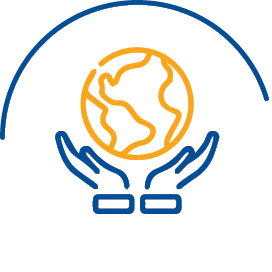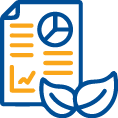IDENTIFYING OUR MATERIAL ISSUES
At Federal Bank, material topics are defined as focus areas derived from various stakeholder engagements and form a key input into our business strategy. During FY 2022-23, we conducted a comprehensive materiality assessment exercise in accordance with the requirements outlined by the GRI standards. With this, we strived to ensure a comprehensive understanding of the issues and topics most significant to our stakeholders and the business. The subsequent identification of the material topic universe was based on peer analysis and recommendations from sustainability standards and frameworks, specific to the financial sector. Our Bank’s senior leadership identified the key business outcomes for this exercise by carefully evaluating the range of impacts that the material topics could have on Federal Bank. By engaging in this rigorous assessment, we aim to proactively address the most relevant issues and enhance our sustainability practices, while remaining resilient in the face of adversities.



Phase 1 - Identification of Sustainability Topics
During the initial phase of the materiality assessment, we engaged in a comprehensive analysis of our Bank’s organisational context, including our activities, business relationships, sustainability context, and stakeholders. This involved a thorough examination of our Bank’s operations and their potential impacts, both present and future. Our Bank also actively sought input from relevant stakeholders and experts to gain insights into the significance of these impacts.

Phase 2 - Shortlisting
Following the identification of sustainability topics, we proceeded to shortlist 40 topics as potentially material. This shortlisting process took into account the sector in which our Bank operates and the macro-business environment, ensuring that the topics were relevant to our Bank’s operations. Our Bank also considered the sustainability topics identified by our peers as well as the interests and concerns raised by our stakeholders.

Phase 3 - Prioritisation
In this phase, we identified and prioritised the material topics based on their impact on the economy, environment, and people, including the potential implications for human rights. To gather a comprehensive understanding of stakeholders’ perspectives, our Bank disseminated survey forms to ensure a broad range of inputs. The prioritised list was finalised with the thirteen most significant material topics.
Following are the Material Topics for the Bank
| Material Topic | Management Approach | Potential/Actual Impact | SDG Linkage | GRI Linkage |
|---|---|---|---|---|

Corporate Governance and Ethics |
Strong corporate governance and ethical practices are upheld at the Bank through its policy on anti-bribery and anti-corruption. The Policy and procedures ensure transparency, accountability, and trustworthiness, leading to long-term sustainability and stakeholder confidence. |
Negative a.Impacts brand value & reputation b.Affects transparency on compliance-related matters c.Affects the confidence of various stakeholders |
SDG 16 Peace, Justice, and Strong Institutions |
GRI 2: General Disclosures, |

Economic Performance |
Financial performance and stability are crucial for the Bank’s business continuity, investment, and economic growth, contributing to sustainable development. The following policies have been adopted in this regard: Tax Policy, Model Policy on Deposits, and Fair Practice Code for Lenders, among others. |
Positive a.Impacts the share price b.Impacts the relationships with stakeholders |
SDG 8 Decent Work and Economic Growth |
GRI 201: Economic Performance |

Regulatory Compliance |
Our Bank ensures compliance with laws, regulations, and standards to ensure reduced legal risks, foster trust, and avoid penalties. This also ensures continuous support for sustainable business operations. |
Negative a.Affects compliances with current and emerging regulations |
SDG 16 Peace, Justice, and Strong Institutions |
GRI 205: Anti-corruption |

Digital Leadership |
Effective digital leadership enables the Bank to adapt to technological advancements, drive innovation, and create competitive advantages. |
Positive a. Delivering fast & convenient services round the clock 24/7 for customers b. Increases revenue c. Led to 107.81 Lakh of paper being saved during the year d. Led to 152.09 Lakh litres of fuel saved due to transformation to digital journey by our customers |
SDG 9 Industry, Innovation, and Infrastructure |
|

Employee Well-being and Development |
Promoting employee well-being and providing growth opportunities are a priority for the Bank. It enhances productivity and job satisfaction of the staff and leads to talent retention. The Bank’s commitment to its employees is reflected via the Diversity, Equity and Inclusion Policy and The ESG Policy. |
Positive a. Job satisfaction of employees and talent retention b. Increases the productivity of an employee c. Lowered attrition rate of 3.75% |
SDG 3 Good Health and Well-being |
GRI 401: Employment |

Customer Privacy and Data Security |
Protecting customer privacy and ensuring data security is a top priority for the Bank. Ensuring data security and privacy at all levels of operation helps the Bank build trust, safeguard personal information, and maintain brand reputation. The Bank has adopted various policy and procedures to safeguard and care for its customers like the Code of Bank’s Commitment to Customers, Customer Compensation Policy, Policy on Customer Service and Policy on Customer Protection. |
Negative a. Impacts business, customer satisfaction and brand value |
SDG 16 Peace, Justice, and Strong Institutions |
GRI 418: Customer Privacy |

Sustainable Finance |
The Bank is committed to integrate environmental, social, and governance (ESG) factors into its financial decisions to mobilise investments for sustainable development. |
Positive a. Impacts the economy and risk mitigation b. Enhances brand reputation and trust |
SDG 9 Industry, Innovation, and Infrastructure |
GRI 201: Economic Performance |

Fraud Risk Management |
The Bank’s robust fraud risk management systems and its policy on combatting financial crimes, safeguard resources, prevent financial losses, and help uphold ethical business practices. |
Negative a. Affects business’s performance and continuity b. Impacts the Bank’s reputation |
SDG 16 Peace, Justice, and Strong Institutions |
GRI 205: Anti-corruption |

Climate Change Risk and Impact |
Assessing and mitigating climate change risks, including Greenhouse Gas (GHG) Emissions, helps the Bank combat global warming and its adverse effects. The Bank’s commitment is reflected in its ESG Policy. |
Negative Affects the Bank’s due to physical and transition risks Following steps have been taken to adapt and mitigate the risks: a. Green loans continuity b. Exclusion list c. Phased reduction of coal-related exposure d. Generation of renewable energy e. LEDfication f. Using star-rated air conditioners which reduce power consumption g. Capturing Scope 1, 2 and 3 Emissions h. Disaster recovery mechanism |
SDG 13 Climate Action |
GRI 305: Emissions GRI 307: Environmental Compliance |

Product Innovation |
The Bank continuously strives to drive product innovation. This, in turn, drives competitiveness, addresses market needs, and enables sustainable consumption and production. |
Positive a. Impacts business, customer satisfaction and acquisition |
SDG 9 Industry, Innovation, and Infrastructure |
|

Transparency and Fair Disclosure |
The Bank’s transparent and fair disclosure practices help promote accountability, stakeholder engagement, and informed decision-making. |
Positive a. Impacts stakeholder relationships |
SDG 16 Peace, Justice, and Strong Institutions |
GRI 2: General Disclosures |

Customer Satisfaction |
The Bank prioritises customer satisfaction and experience. Ensuring customer satisfaction helps the Bank improve loyalty, brand reputation and foster positive relationships with customers. |
Positive a. Impacts business and profits b. Impacts brand reputation |
SDG 3 Good Health and Well-being |
GRI 416: Customer Health & Safety |

GHG Emission Management |
Managing and reducing Greenhouse Gas (GHG) Emissions to mitigate climate change impacts and support a low-carbon economy. In this regard the Bank has taken various initiatives to reduce its energy consumption pan India. |
Negative a. Impacts the Bank’s energy efficiency b. Impacts brand valueFollowing steps were taken towards efficient energy management: a. Generation of renewable energy b. LEDfication c. Using star-rated air conditioners which reduce power consumption d. Capturing Scope 1,2 and 3 Emissions |
SDG 13 Climate Action |
GRI 305: Emissions |
SDG - Sustainable Development Goals, GRI-Global Reporting Initiative
The materiality assessment undertaken by Federal Bank aims to capture the key sustainability topics that are of significance to our Bank and stakeholders. Through this process, we seek to align our sustainability strategy with the interests of our stakeholders and address the most critical areas where we can make a positive impact. By prioritising these material topics, Federal Bank aims to ensure a targetted and effective approach towards sustainable practices and responsible business conduct, thereby contributing to the long-term well-being of the economy, environment, and society.

